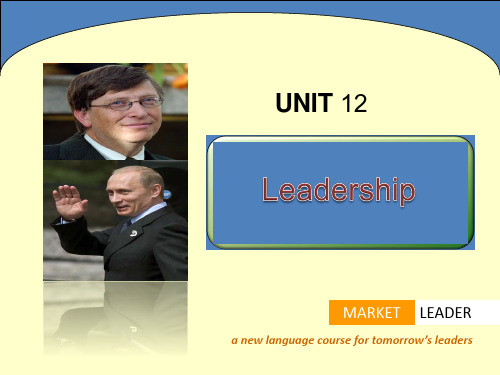Lesson_12_Leadership_领导力
- 格式:ppt
- 大小:7.96 MB
- 文档页数:39


领导力(Leadership)的本质『我们在遇到危机局面时,会渴望Leader Ship领导力。
会盼望具有解决危机方法,果断、强有力的人。
在企业经营上,长久以来Leader Ship领导力都被解析为最高经营干部或最高经营者的角色。
而最近Leader Ship的概念,在与Management之间画上了一笔。
也就是说Leader Ship变成了“提出Vision,赋予影响力,以非强制性的方法实践Vision”的一种概念。
』当今,我们社会针对Leadership的危机产生了很多争论,同时危机的本质被误判的情况非常多。
我们通常会将问题的原因转移给具有Authority(权威或权利,权限)的人,并且过于简单的将责任嫁接给这些人,把他们当做牺牲羊。
但是,具有Authority的人,因为无法提出解决方案,成为人们经历痛苦原因的情况,几乎是不存在的。
将痛苦的根源,当做具有Authority的人,是因为痛苦的原因过于单纯化。
我们在遇到危机局面时,会渴望Leader Ship领导力。
会盼望具有解决危机方法,果断、强有力的人。
换句话说,人们都渴望可以把复杂的问题单纯化的人。
但是,现在的问题的复杂程度,是过去的问题无法比你的。
而且,复杂的问题,是不单纯的。
不付出代价,单纯性的解决方法,是不存在的。
这个世界是没有救世主的。
重要的不是寻找救世主,而是面对难题,要寻求具有挑战能力的Leadership。
各种两极化现象、脆弱的产业竞争力、恶劣的公共教育、环境问题、财政亏损、建设性外交关系的绊脚石、低生育和老龄化问题等,包括企业当中的各种无数的难题层出不穷。
为了解决这些问题,光有一个从上往下提出解答的人(领导人)是不够的。
不改变我们的心态,行为模式、价值观是不行的。
不可以对Authority产生不恰当的期待,而要提升自己的适应能力,对Leadership形成新的思考。
1990年代以后,在品质经营(Quality Management)中,Leadership也成为了一个重要的议题。




leadership(领导力)LeadershipA: I’ve heard of a interesting viewpoint I’d like to share with you.S: Really, what is it?A: Effective managers are not necessarily true leaders.S: That’s interesting, but why?A: The secret lies on the ability to lead effectively, which can set the excellent managers apart from the average ones. Many managers focus on superficial activities and worry about short-term profits and stock prices, too few have emerged as leaders who foster innovation and attainment of long-term goals.S: I see, that means true leadership includes effectively orchestrating important change. While management requires structuring the organization, staffing it with capable people, and monitoring activities; leadership goes beyond these functions by inspiring people to attain the vision. Great leaders keep people focused on moving the organizaion toward its ideal future, motivating them to overcome whatever obstacles lie in the way.A: That’s right. And there are two kinds of leadership supervisor and strategic leadershi p. Supervisory leadership is behavior that provides guidance, support and corrective feedback for the day-to-day activities of work until members. Strategic leadership gives purpose and meaning to organizations. And it needs to be an activity performed by people throughout the organization, not just by a few people at the very top.S: Yes, leadership is very important to a organization. But organizations succeed or fail not only because of how well they are led but because of how well followers follow.A: I agree with you. The most effective followers are capable of independent thinking and at the same time are actively committed to organizational goals. As a manager, you will be asked to play both roles. As you lead the people who report to you, you will report to your boss.S: Do you know what is the important factor of effective leadership?A: It’s power----the ability to influence other people. In organizations, this often means the ability to get things done or accomplish one’s goals despite resistance f rom others.S:That’s right.A: Do you know what are the sources of powers?S: There are 5 sources, authority, control over rewards, control over punishiments, appealing personal characteristics, and expertise. Do you know traits the leaders have can distinguish effective leaders from other people?A: I think the first one is drive. It refers to a set of characteristics that reflect a high level of effort. Drive includes high need for achievement, constant striving for improvement, ambition, energy, and initiative. Second is leadership motivation.Great leaders not only have drive; When the power need is exercised in moral and socially--constructive ways, rather than to the deteriment of others, leaders will inspire more trust, respect and commitment to their vision.S: Yes, besides that, integrity , self-confidence, and knowledge of the business are also important. Integrity is the correspondence between actions and words. Self-confidence allows a leader to overcome obstacles, make decisions despite uncertainty, and instill confidence in others. Leaders must have the intelligence to interpret vast quantities of information.Advanced degrees are useful in a career, but ultimately less important than acquired expertise in matters relevant to the organizaion.A: All in all, leadership means being able to assess others, evaluate the situation, and select or change behavior to more effectively respond to the demands of the circumstances.S: Yes, I agree with you.。
曾国藩领导力十二讲英语读后感After reading "Twelve Lectures on Leadership by Zeng Guofan", I am deeply impressed by the profound insights and practical wisdom shared by this influential historical figure. Zeng Guofan's leadership principles are not only relevant in the past, but also provide valuable guidance for leaders in today's world.First and foremost, Zeng emphasizes the importance ofself-cultivation and moral integrity as the foundation of effective leadership. He advocates for leaders to cultivate a strong character, uphold ethical principles, and lead by example in order to earn the trust and respect of others.Furthermore, Zeng highlights the significance ofstrategic thinking and decision-making in leadership. He emphasizes the need for leaders to adopt a long-term perspective, anticipate challenges, and make prudentdecisions that align with the overall goals and mission of the organization.In addition, Zeng emphasizes the value of fostering a harmonious and cohesive team. He encourages leaders to nurture a supportive and inclusive work environment, cultivate the talents of others, and promote collaboration and unity among team members.Moreover, Zeng underscores the importance of continuous learning and self-improvement for leaders. He emphasizes the need for leaders to be open-minded, receptive to new ideas, and willing to adapt to changing circumstances in order to stay ahead in a rapidly evolving world.Overall, Zeng Guofan's lectures on leadership offer timeless wisdom and practical advice for leaders at all levels. His emphasis on moral integrity, strategic thinking, team building, and continuous learning provides a solid framework for effective leadership in any context. I believethat his teachings will continue to inspire and empower leaders for generations to come.。